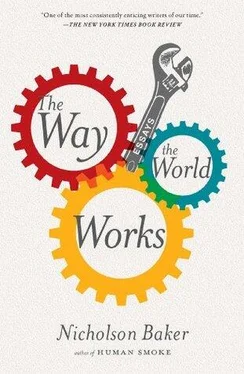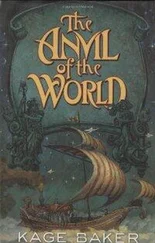Nicholson Baker - The Way the World Works
Здесь есть возможность читать онлайн «Nicholson Baker - The Way the World Works» весь текст электронной книги совершенно бесплатно (целиком полную версию без сокращений). В некоторых случаях можно слушать аудио, скачать через торрент в формате fb2 и присутствует краткое содержание. Год выпуска: 2012, Издательство: Simon & Schuster, Жанр: Публицистика, Критика, на английском языке. Описание произведения, (предисловие) а так же отзывы посетителей доступны на портале библиотеки ЛибКат.
- Название:The Way the World Works
- Автор:
- Издательство:Simon & Schuster
- Жанр:
- Год:2012
- ISBN:нет данных
- Рейтинг книги:4 / 5. Голосов: 1
-
Избранное:Добавить в избранное
- Отзывы:
-
Ваша оценка:
- 80
- 1
- 2
- 3
- 4
- 5
The Way the World Works: краткое содержание, описание и аннотация
Предлагаем к чтению аннотацию, описание, краткое содержание или предисловие (зависит от того, что написал сам автор книги «The Way the World Works»). Если вы не нашли необходимую информацию о книге — напишите в комментариях, мы постараемся отыскать её.
), here assembles his best short pieces from the last fifteen years.
The Way the World Works
OED
Modern Warfare 2
Through all these pieces, many written for
, and
, Baker shines the light of an inexpugnable curiosity.
is a keen-minded, generous-spirited compendium by a modern American master.
The Way the World Works — читать онлайн бесплатно полную книгу (весь текст) целиком
Ниже представлен текст книги, разбитый по страницам. Система сохранения места последней прочитанной страницы, позволяет с удобством читать онлайн бесплатно книгу «The Way the World Works», без необходимости каждый раз заново искать на чём Вы остановились. Поставьте закладку, и сможете в любой момент перейти на страницу, на которой закончили чтение.
Интервал:
Закладка:
Here’s what it’s about. It’s about killing, and it’s about dying. Also, it’s about collecting firearms. And it’s modern warfare, which means it’s set in places like Afghanistan. As in Halo, you are a gun that moves — in fact, you are many guns, because with a touch of your Y button you can switch from one gun to another. But this game has a much crisper, brighter look than the murky Halo, and the graphics engine is better, and the telescopic rifle scopes, their lenses pale blue and curvingly reflective, are a delight to peer through. “Yesterday’s enemies are today’s recruits,” says the narrator, General Shepherd, who is full of little bits of wisdom like that, until he slides over to the dark side.
The first thing you have to do is learn how to aim and shoot, and to do that you run through a training course in Afghanistan with pop-up wooden targets. Some targets depict enemies — they have angry frowns and wear turbans and look like Khomeini — and some depict civilians: boys in blue-striped polo shirts, little girls in dresses, and a plump man in a button-down shirt. The training course keeps track of how many civilians you’ve killed and how many frowning Khomeinis, while a corporal shouts at you to hurry up: “Go, go, go!”
You do so well as Private Allen, shooting Arabs in Kabul, that you are enlisted to help out the CIA, which is up to nothing good in Russia. Then, as part of something called Task Force 141, you begin dying in earnest. I don’t know how many times I was killed as I tried to work toward the northeast section of a runway in order to plant a bomb. (This was at a military base in Kazakhstan.) I wandered tensely through cold Quonset huts. Each time, a jeep would park, and there was a sudden surge of Russian voices and men would aim at me and shoot me. I was shooting them, too. My name during this phase of the game was Roach. “Roach, search the northeast part of the runway for the fueling station!” my commander, Soap MacTavish, said repeatedly, in his Scottish burr. When I got someone in the head, MacTavish would say, “Nicely done,” or “Good kill.” When I shot badly, he would say, “That was sloppy.” I always felt better when MacTavish was telling me what to do.
When you’re hit in Modern Warfare 2, the bullets make a zing and then a flump. Your field of view jolts and gets alarmingly blood-dropletted around the edges. You begin to gasp. The sound goes hollow, as if you’re listening through a long tube, the controller vibrates, and you know that you have only a moment of life left. As your head hits the ground, the screen’s image turns suddenly diagonal and fuzzes out. There’s a swooshing in your ears, followed by a brief whistling-teakettle sound. The last thing you hear is MacTavish shouting, once again, from far away, “Roach, search the northeast corner of the runway!”
Then, at the blood-blurred moment of death, you are rewarded with a literary quotation. These come from Einstein, Voltaire, Zora Neale Hurston, Edward R. Murrow, Churchill, Machiavelli, Dick Cheney — all sorts of apropos people — and they are confusingly contradictory. Some quotes are cynical, some pacifist, some earnestly pro-war. Cheney says, “It is easy to take liberty for granted when you have never had it taken from you.” Gandhi says, “An eye for an eye only ends up making the whole world blind.” These neat word packets, displayed just as you’ve been shot or blown up by a grenade, mock the notion that there is any body of aphoristic wisdom that can be applied to a fatal firefight. You’re lying in the snow, dead. Words of wisdom mean nothing now.
But of course you’re not really dead. Almost immediately, you respawn. You’re given another chance. You’re given many, many chances, because Modern Warfare 2 is just about the dyingest game out there. It isn’t, in my reading, a glorification of modern warfare. You play for three hours and you think, This? This chaotic chattering absurdity and panic and wasted ardor is what we mean by “troop surge”? It is an unjingoistic, perhaps completely cynical amusement. The CIA, covertly making everything worse, gets mixed up in an airport atrocity in Russia, which prompts Russia to attack a residential neighborhood in northeastern Virginia, not far from the Pentagon and CIA headquarters (both in flames), with paratroopers and helicopter gunships. “Ramirez,” a sergeant shouts, voice-acted by Keith David, “take your team and secure the Burger Town!” Also: “Be advised multiple enemy mobiles have been sighted near the taco joint, over!”
I’d been playing alone, but the “single-player campaign,” with its improbable story, is not what Modern Warfare 2 is really about. Most people want to go online and shoot at other real people, not at software soldiers controlled by artificial intelligence. “Single player is like taking a Spanish class,” my son explained. “Multiplayer is like going to Spain.” In multiplayer, you choose a locale — for instance, the submarine base — and a style of competition. There’s Team Deathmatch, Capture the Flag, Domination, and others. And then you run around shooting and setting claymore mines where other players won’t see them when they walk into a room. If you kill three people without dying, you can get a U.A.V. — a Predator drone. A kill streak of nine gives you a Stealth Bomber air strike. If you kill twenty-five people in a row, you can get a tactical nuclear weapon, and the game is over. You get frequent bonuses and awards — new weapons, new ammunition, new scopes, new camouflage, new proficiencies. “It’s like they’ve got you on a drip feed of sugar,” my son said. “The only way you get the next little drip is by playing a little more.”
In multiplayer you kill and die so often that a single statistic becomes extremely important to you: your kill-to-death ratio. As you get better — reviewing your deaths on “killcam” instant replay to see who got you — your kill-to-death ratio goes to one and then to more than one. One of my son’s friends, a good student, has a kill-to-death ratio of 1.65. In 219 hours of game-playing, he has killed 32,884 times and died 19,956 times. My son, who believes that wars serve no purpose, has played for 96 hours, and he has a kill-to-death of 1.17; it was 1.4 when he was playing every day. Mine is 0.08.
In order to give me a taste of multiplayer madness, as I practiced my shooting and my sprinting skills, my son set us up by ourselves in a location called Rust — a place in Afghanistan where there is an old oil installation. Sitting side by side and watching our characters on the split screen, we spawned out in Rust, and he began running circles around me. I could hear his feet going pad pad pad pad in the sand, and then the sound changed and became hollow as he ran onto a pipe. I would look around, trying to find him — and then I’d see that he was a few feet away, pointing his gun at my head. His character was an American soldier, I noticed. My character, which I saw when I looked at his split-screen image, was some bad jihadist with Arabic writing on my head scarf.
We were very considerate of each other in the beginning. My son could have shot me many times, but he didn’t. “Go ahead!” I said. “No, Dad,” he said, “I’m not going to shoot you.” He followed me around, waiting for me to take some shots. We carried on this peculiar chivalry for fifteen minutes, sometimes using riot shields, whose glass cracks realistically under repeated fire. Finally I wounded him, and he stabbed me, and we relaxed and began shooting and sniping and running and laughing, just as he did with his friends via inter-couchal headsets. We switched to another map, Afghan, which has as its centerpiece a C-130 transport plane that has crashed somewhere in the mountains of Afghanistan. There were thick-budded poppies growing in the sun, with PVC irrigation pipes over them. Again I heard my son’s sprinting footsteps — he had a multiplayer perk that allowed him to run forever without tiring. He knew a way to get up on the fuselage — I could hear him running down the metallic skin — and onto the tail, and from there up onto a high cliff. I’d spray bullets in a semicircle, and then there would be a single quick sniper shot and I’d be dead. Then he’d apologize. “Sorry, Dad, I didn’t mean to kill, only to maim.” I died often enough that I received a temporary health boost called a “painkiller deathstreak.” By the end, I’d improved — so he said — and I’d machine-gunned him a few times. We went off to dinner full of weird camaraderie.
Читать дальшеИнтервал:
Закладка:
Похожие книги на «The Way the World Works»
Представляем Вашему вниманию похожие книги на «The Way the World Works» списком для выбора. Мы отобрали схожую по названию и смыслу литературу в надежде предоставить читателям больше вариантов отыскать новые, интересные, ещё непрочитанные произведения.
Обсуждение, отзывы о книге «The Way the World Works» и просто собственные мнения читателей. Оставьте ваши комментарии, напишите, что Вы думаете о произведении, его смысле или главных героях. Укажите что конкретно понравилось, а что нет, и почему Вы так считаете.












